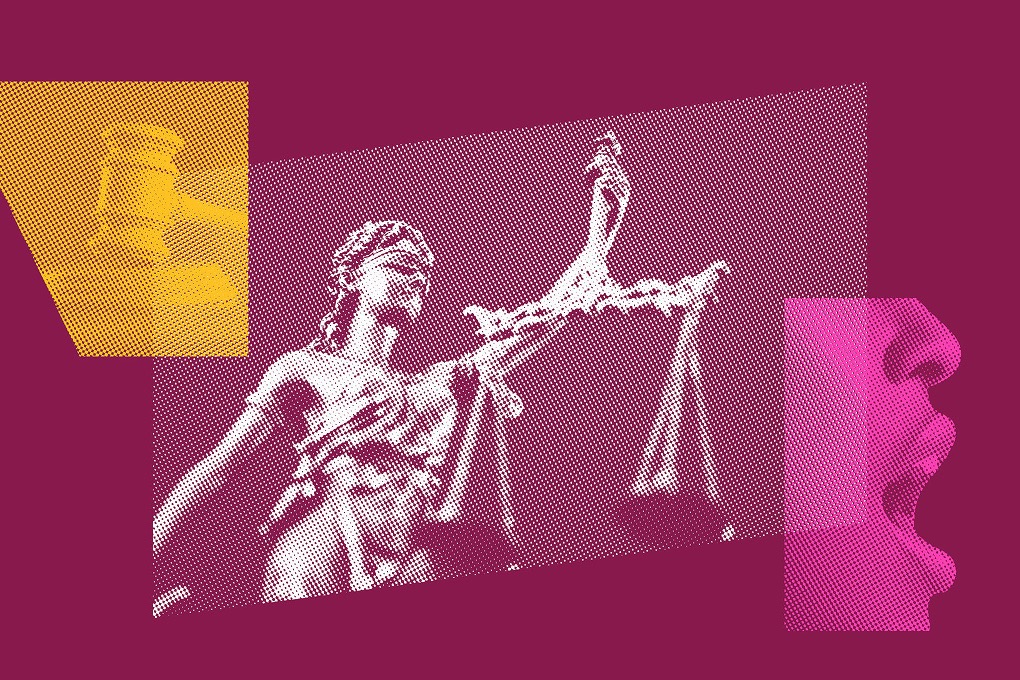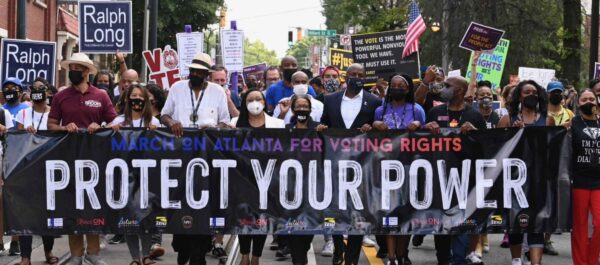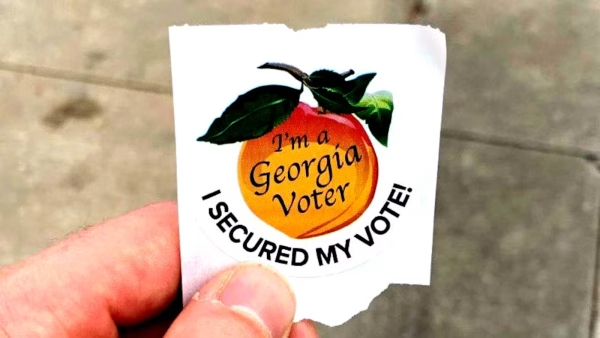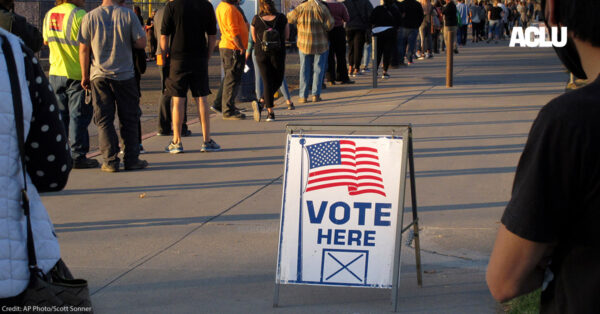Georgia
Featured
Georgia
Jun 2020

Disability Rights
Harris v. Georgia Department of Corrections
On October 3, 2018, the ACLU and the ACLU of Georgia, together with National Association of the Deaf and Weil, Gotshal & Manges, LLP, filed a federal lawsuit on behalf of deaf and hard of hearing people incarcerated in prisons supervised by the Georgia Department of Corrections (GDC). The complaint highlights GDC’s failure to provide incarcerated deaf and hard of hearing people with equally effective communication access to programs, services, and activities, including medical care, telecommunications, and prison programs. Further, due to lack of access to interpreters and other communication accommodations, deaf prisoners are also often unable to explain or defend themselves when GDC takes disciplinary action against them.
All Cases
28 Georgia Cases

Georgia
Feb 2025
Criminal Law Reform
State of Georgia v. Wierson
This case asks whether Georgia’s insanity defense statutes can be construed to contain an exception for cases where defendants allegedly triggered their own insanity by discontinuing their medication weeks before the alleged crimes. The State argues for such an exception, even though the text of the insanity defense statutes expressly pins the availability of the defenses to the defendant’s mental condition “at the time of” the alleged crimes. The ACLU’s State Supreme Court Initiative, along with the ACLU of Georgia, filed an amicus brief arguing that even if the State’s interpretation of the statutory text were reasonable, its argument should still be rejected because it contradicts the rule of lenity. The rule of lenity is a well-established canon of statutory construction requiring that, if a criminal statute can reasonably be interpreted in different ways, courts must adopt the interpretation most favorable to the accused.
Explore case
Georgia
Feb 2025

Criminal Law Reform
State of Georgia v. Wierson
This case asks whether Georgia’s insanity defense statutes can be construed to contain an exception for cases where defendants allegedly triggered their own insanity by discontinuing their medication weeks before the alleged crimes. The State argues for such an exception, even though the text of the insanity defense statutes expressly pins the availability of the defenses to the defendant’s mental condition “at the time of” the alleged crimes. The ACLU’s State Supreme Court Initiative, along with the ACLU of Georgia, filed an amicus brief arguing that even if the State’s interpretation of the statutory text were reasonable, its argument should still be rejected because it contradicts the rule of lenity. The rule of lenity is a well-established canon of statutory construction requiring that, if a criminal statute can reasonably be interpreted in different ways, courts must adopt the interpretation most favorable to the accused.

Georgia
Dec 2024
Voting Rights
Sixth District of the African Methodist Episcopal Church v. Kemp
Civil rights groups filed a federal lawsuit on March 29, 2021, against Georgia’s sweeping law that makes it much harder for all Georgians to vote, particularly voters of color and voters with disabilities. This law spans all aspects of Georgia’s voting process, including imposing a criminal ban on providing food and water to voters waiting in line, limiting dropbox access and ballot return assistance, rejecting absentee ballots for forgetting to add a birthdate to an envelope or for failing to provide more restrictive identifying information or photo ID copies along with absentee ballots. Premised on low voter confidence and born out of the Big Lie about the 2020 election, this law targets methods of voting disproportionately used more and more by Black voters and others voters of color just as they began to exercise greater political power.
Explore case
Georgia
Dec 2024

Voting Rights
Sixth District of the African Methodist Episcopal Church v. Kemp
Civil rights groups filed a federal lawsuit on March 29, 2021, against Georgia’s sweeping law that makes it much harder for all Georgians to vote, particularly voters of color and voters with disabilities. This law spans all aspects of Georgia’s voting process, including imposing a criminal ban on providing food and water to voters waiting in line, limiting dropbox access and ballot return assistance, rejecting absentee ballots for forgetting to add a birthdate to an envelope or for failing to provide more restrictive identifying information or photo ID copies along with absentee ballots. Premised on low voter confidence and born out of the Big Lie about the 2020 election, this law targets methods of voting disproportionately used more and more by Black voters and others voters of color just as they began to exercise greater political power.

Georgia
Nov 2024
Voting Rights
Ayota v. Fall
On October 31, 2024, just five days before the November 5 General Election, Cobb County announced that it had failed to send more than 3,000 absentee ballots to Cobb County voters who had timely requested them. Many of these voters are at school hundreds of miles away or have disabilities that make it all but impossible to vote in person. The ACLU and co-counsel sued on behalf of affected voters to ensure that they would not be disenfranchised because of the County's administrative error.
Explore case
Georgia
Nov 2024

Voting Rights
Ayota v. Fall
On October 31, 2024, just five days before the November 5 General Election, Cobb County announced that it had failed to send more than 3,000 absentee ballots to Cobb County voters who had timely requested them. Many of these voters are at school hundreds of miles away or have disabilities that make it all but impossible to vote in person. The ACLU and co-counsel sued on behalf of affected voters to ensure that they would not be disenfranchised because of the County's administrative error.

Georgia
Oct 2024
Voting Rights
Heimel v. Gregg
The ACLU and partners intervened in a lawsuit that sought to illegally disenfranchise hundreds of Oconee County voters on the eve of the November 5 election. The Oconee lawsuit is just one in a wave of similar attempts by election vigilantes across the state to indiscriminately purge voters from the voter rolls in violation of the law.
Explore case
Georgia
Oct 2024

Voting Rights
Heimel v. Gregg
The ACLU and partners intervened in a lawsuit that sought to illegally disenfranchise hundreds of Oconee County voters on the eve of the November 5 election. The Oconee lawsuit is just one in a wave of similar attempts by election vigilantes across the state to indiscriminately purge voters from the voter rolls in violation of the law.

Georgia
Oct 2024
Voting Rights
Quinn v. Raffensperger
The ACLU, along with several partner organizations, have sought to intervene in this case to represent the rights of voters and voting-rights organizations in a case that asks a federal court to compel the state to conduct list maintenance and move voters to the inactive list on the eve of a presidential election. The relief that the private plaintiffs seek is presumptively unlawful because this list maintenance activity would happen within 90 days of a federal election, in violation of the National Voter Registration Act (“NVRA”).
Explore case
Georgia
Oct 2024

Voting Rights
Quinn v. Raffensperger
The ACLU, along with several partner organizations, have sought to intervene in this case to represent the rights of voters and voting-rights organizations in a case that asks a federal court to compel the state to conduct list maintenance and move voters to the inactive list on the eve of a presidential election. The relief that the private plaintiffs seek is presumptively unlawful because this list maintenance activity would happen within 90 days of a federal election, in violation of the National Voter Registration Act (“NVRA”).